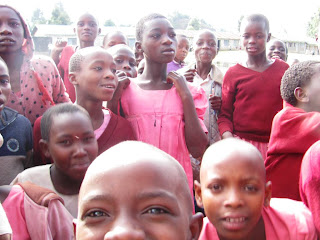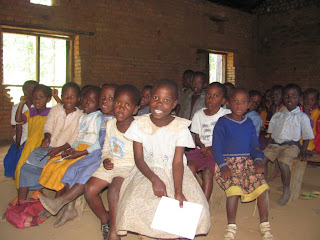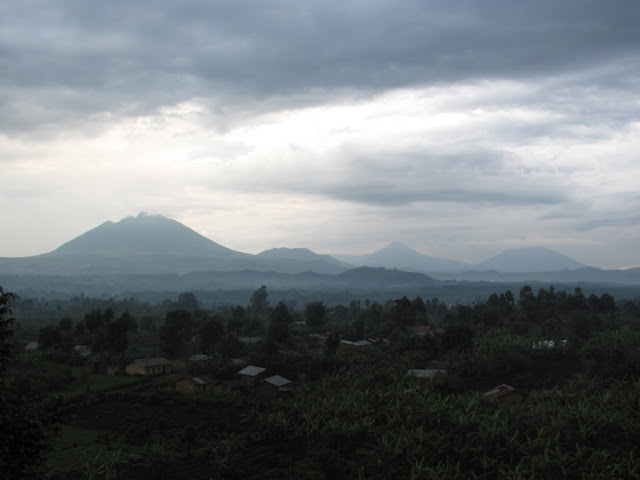Iryaruvumba
The remote villages in Western Uganda have, by far, been the most interesting of days. Not only the journey to get there, but the scenery along the way and of course the interactions with the villagers once we arrive are incredible. The roads are unbelievable. As we set off, our driver Ezra, calls out "welcome aboard the jumping horse", as he lovingly and appropriately refers to his vehicle. Ezra drives us to the village of Iryaruvumba with the winding, bumpy roads it takes us two hours to cover the 30 miles (50 kilometers). I sit in the front seat holding the sleeping baby. Of course, there's no car seats or seatbelts so I embrace Jael so tightly that I'm afraid she'll suffocate. I am amazed that she can sleep with all the bouncing and jerking of the "jumping horse". Ezra tells me she can sleep because "she has a nice cushion to sleep on." I look down at the "cushion" he refers to. Little does he know it's more like a pin cushion on a bag of bones than a comfortable pillow. While we're bouncing along Emily shouts from the back seat, "do you have roads like this in America?" I smile and think of various "minimum maintenance" field roads or old wagon roads in Alaska that were used over a hundred years ago to haul supplies with horses and wagons as I tell her, "well, we do but we don't DRIVE on them!"
 |
| A nice, flat, muddy section of road. |
Immaculate teaches Sunday school teachers how to conduct Sunday school classes in these remote villages. It's a good class, they teach them to make each child feel special, listen to the child's concerns, let them know that they are important, etc. As I hear the overview of the class, I think they should consider teaching all the regular school teachers this class. Many of the people that attend the class walk for hours and hours to get there. When I'm told that the class starts at 9 a.m., then we don't leave home for the two hour journey until 10 a.m. I am very perplexed. I realize, upon arrival that the villagers are still making the journey, they left home before it was light out and they arrive right around 11 a.m. The same time as us. I can't help but wonder, why you would possibly set the start time for 9 a.m. knowing full well that it won't start before noon? You see, once we arrive, we MUST take tea. It would be considered horribly rude not to serve tea to those of use who just made the two hour journey in the jumping horse. I can't help but notice that none of the villagers are offered tea when they arrive and I'm certain they didn't have breakfast before they left home, I sit quietly and am forced to enjoy my fourth slice of bread of the day. When I suggest we ask some of the people outside to join us, they laugh. "There isn't enough for everyone"!
 | |||||||
| Kids peeking in the church windows. The baby is tied on the girls back in the typical African style with a blanket or large piece of fabric. |
I spend the day walking with Jael tied on my back, African style, while Immaculate teaches. We return to momma when she needs a "sip from the breast" around lunch time. We wander around the village, making friends and saying "Hello" to the many voices that come from every direction. Often we don't even see a person, we just hear "Hello Muzungu" from out of the bushes, or from behind a home. I thought maybe we would walk around the village, find a little local restaurant for lunch and sit in the shade of a big tree and play with the village children. There's no restaurant, the village contained about 100 homes and a church. There might have been a shop or two as well, back at the corner, but there's no way we were walking back there in today's blazing sun. Instead we take short walks, watch the cows grazing, watch the chickens crow and keep making our way back to the shade of the big tree outside the church. When 3:00 rolls around we go for lunch at the Preachers' home. We sit in the dark living room around a short coffee table and enjoy rice, beans and posho. Back outside sitting under the shade tree all the kids want to say hello, touch the muzungu and hold the baby. They are allowed two of their three wishes. All the snotty noses and coughing, I am sure Jael would be sick for weeks! They look at me like I had slapped them when I make a "uuuuh, uuuh, uuuuh" sound when they go to pick her up. It is very normal for anyone to pick up any baby and hold it. Only a muzungu would tell them "no"!
Kabindi
The following Saturday we arrived at the village of Kabindi there are four of us in the car, plus Jael. The children of the primary school happened to be outside, or from what I could tell, that's what they did with their day was play outside. Regardless, when the car pulled up and they saw the muzungu inside it was an ambush.
 |
| Oh Oh! Here they come! |
 |
| Hello Muzungu! |
Gitovu
On the, yet again, the rough and unbelievably bumpy ride to the village of Gitovu, I saw very little life. Though there were paths leading into the bush, which I assumed people lived. Their was the occasional child taking cows or goats to graze strolling down the middle of the road until we came along and forced them to the side of the road. Yet, when we arrived at our destination there was a government school, or a public school. It is funded by the government so it is free for the students to attend. There are 800 students in the school and just nine teachers, total! Where, out of the hills and forests these 800 children came from I can't imagine. After tea and a quick stretch of the legs Jael and I decided to walk next door to say "hello" to the students. We were very warmly greeted, or you might say, "very warmly swarmed"! They happened to be outside having a track and field day when we arrived, even the ones who were actually racing when we walked up changed their course and came running directly at us. That is until the teachers came along with their sticks whacking them on the backs of their legs to get them back in line. How else do you control 800 students?!
 |
| Here they come!!! |
 | |
| P1 or 1st Grade at Gitovu Primary School~ 160 first grade students and ONE teacher! |
 |
| The lunch room ~ many students walk for hours to school, carrying their own lunch. |
 |
| Top Class or Kindergarden class |
 | |
| Learning numbers at Gitovu Primary |
Nyarubande & Kirwa Villages
On this particular Saturday I went with Teacher Beata, Teacher Kate and their four children to their home villages. It was amazing. We piled in the car and set off around 11 a.m. The car bumped along and we enjoyed the scenery of stone walls made from volcanic rock, bright green beans climbing up many tall sticks in the black, volcanic soil. I passed out samosa's filled with cold peas and the children happily munched on them. It was their breakfast. Possibly their lunch as well. The road turned into a grassy path and old men waved to us as we passed. After about an hour we arrived at Teachers Beata's home. She actually lives at the school with her two girls and her husband lives in Kampala and works in a factory there. This village is where her husband is from and where she "got married from". They have a mud home here, in the compound of his family home. As we enter the small sitting area, we squeeze onto the couch and chairs and we are surrounded by piles of corn. Since they aren't here the house is now being used for maize storage.
We take porridge and decide we should set off. We are walking to the market. We head down the path, the children and the car stay behind. It is too far for them. We begin walking through fields with women digging, Beata knows and greets everyone. They get such a kick out of it when I greet them in the local language. I can hear them laughing, "muzungu ....Rufumbera..." Something about a muzungu speaking Rufumbera, which is the local language here. One woman asks me if I can "manage" to plant beans like she is doing. I tell her yes as I stick out my hand for a handful of beans to plant. I bend over, just like she is, I dig a little hole with my finger, just like she was doing and drop in a bean. I continue dropping one bean at a time, every once in a while I drop two or three and she laughs. Obviously the muzungu can't manage! When I'm done with the handful I tell her, "your day will be easy now, since I helped you!" She laughs and we keep walking.
We pass many people on their way to and from the market. There's children carrying loads on their heads, there's old women chatting and laughing as they walk by. We meet three young boys who have a homemade bicycle to carry their matoke. The entire bicycle is made of wood, including the wheel and the pins that hold the wheels in place. Very creative! Sometimes I feel like I've stepped back in time! We walk for an hour and suddenly I hear voices. Just over the grassy hill in front of us is a crowd of people. The entire population of the village is about 150. I think every single soul must be at the market. The open field is an array of colors. There are no market stalls, benches or buildings. It is all laid out on the ground. Colorful umbrella's shade the people, a couple have tarps stretched out over them on wooden poles to keep the sun and the rain off of them. This is definitely not a place many muzungus venture to, so you can imagine the kind of greeting I get. Everyone stares, many greet me and most want to give me a "special price". I wonder if by "special price" they actually mean a price five times the actual price.
 |
| Boys and their completely wooden bike! |
We stroll through the market and decide we'll buy some fruit on the way back. Now we need to continue walking to the river before the rain comes. This river has "special salty water that is very good for you." We walk and walk and walk, another hour or more passes and still we see no sign of a river. We walk through shrubs and what looks like a dry river bed. We pass cows and young boys herding them along. I'm told even the cows are taken to the river to drink because it's so good for them. Eventually we do come to a little winding river, I wade in and dip my head in, boys have appeared out of the bushes and everyone things the muzungu dipping her head in the river is hilarious. They also all want to be in the photo. So, after a quick photo session we continue on downstream to where the salt water is. We walk across rock and up more rocky hills and back down to where we finally see an orange pool with tiny bubbles surfacing. I naturally think it's going to be hot, like thermal hot springs. When I touch it is cold. When I taste it, it is like alka-seltzer in my mouth. This natural pool is so salty they mine the rocks, break them open and get big salt chunks out of it. They feed the salt to their cows and even use it for cooking.
 |
| Teacher Beata poking at the salty "alka seltzer" water |
We head back to the market, where we buy bananas and avocados for lunch. We arrive back at teacher Beata's home just as the downpour begins. We sit in the dark, corn filled room and I sing and play games with the kids. When the rain stops we visit with all the old mama's outside for a while. I take their photos and they laugh and hoot when they see their face on the screen.
Finally we climb in the car again and set off down the mud-slicked path. Our driver is good, he knows just when to downshift and just when to step on the gas harder. We drive for about 20 minutes, when he stops and everyone gets out. I follow along and eventually ask why we're getting out. "We are going to Kate's home now!" Of course! We walk up a muddy road for a little while until we see the muddiest and steepest path in the district. They tell me Kate's family home is at the top of this hill. As we clamber up, our shoes covered in red gooey mud, all I can think about is how "fun" the way down will be.
 |
| Kate's parents outside their home. |
It's a quick twenty minute climb and we are greeted by Kate's brother, sister, sister-in-law, mother, father, nieces and nephews. She comes from a family of ten. When the boys marry, they build a home in the family compound. There are about six families living in this compound. We go inside and talk about how the houses are built. It takes 10,000 bricks to build a 40-iron sheet home. If you're good, you can make 10,000 bricks in a week. Her brother explains to me that a mudslide took out their neighbors home last year and two little boys were killed in it. Kate's family is in the process of building a new home down below, where they are out of the danger of landslides. They are very common here, with the heavy rains. We go outside, they live in a mud hut and eat the food that grows on their land, yet they give us sugar cane and fruit to take with us. They also make sure we each have a pole to walk with to help us down the slippery path. Thank God for that pole or it would have been one big slip 'n slide all the way to the bottom. Kate's brother and sister follow us down, barefoot and walking as if the path were flat and dry. Teacher Beata's dress has a big, brown smear across the butt when we get down and the kids' shoes are not visible anymore.
As the sun sets we head home, the driver earned his $8. from me today. It was another beautiful and adventure-filled day surrounded by welcoming and loving Ugandans.







